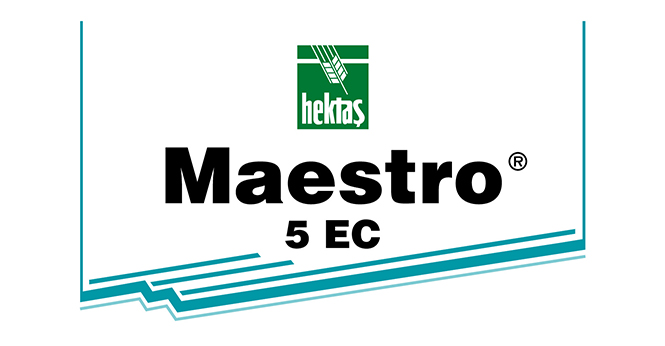
HEKTAŞ MAESTRO® 5 EC
Active Ingredient: 50 g/l Lambda-cyhalothrin
Formulation : EC (Emulsion concentrate)
Packaging : 1 lt, 5 lt, 250 ml
Specifications
Has contact and stomach action; effective with rapid and permanent effect. Not affected by precipitation falling shortly after application. Different from other synthetic pyrethroid pesticides in terms of its mechanism of action and the pest controlled.
Method Of Application
In the cotton field, the plants on 6-8 randomly selected cotton lines of 3 m are checked and bollworm eggs and larva are counted. If there are an average of 2-5 larvae on a line of 3 m, management is decided.
In order to determine the application time against Two-Point Red Spiders in cotton, surveys are started after the plants have 4-6 leaves. If the pest is only locally located on the edge of the field and inside, only these parts should be sprayed with specific drugs. In case the pest spreads to the whole field, if the density reaches 5 red spiders per leaf in the Mediterranean Region and 10 red spiders in the Aegean and Southeastern Anatolia Regions, coating spraying should be done.
In apple codling moth management, sprayings are done according to a forecast and warning system. The aim of apple codling moth management is keeping the trees sprayed at the time of larva emergence in each generation and killing the larva before entering the fruit.
Apple ermine moth: In the 100 leaf bouquet that will represent the garden, spraying is made if there are 4 cluster of larvae that entered the epidermis or made the net.
In grapevine moth management, sprayings are done according to a forecast and warning system. If the number of moths caught in traps has reached peak and started to fall; accumulated degree-days reach 120 degree-days in the first generation, 520 degree-days in the second generation and 1047 degree-days in the third generation; and if, from a phenological perspective, first generation corresponds to the flower bud stage, second generation to unripe grape and third generation to start of sweetening; eggs are checked and spraying is decided according to hatching. One spraying is done for each generation.
Corn: The first spraying is done after the first eggs of the pest are seen, followed by 2nd and 3rd sprayings done at 15-day intervals.
Against sunn pest in cereals, chemical management is decided according to the counts in the fields and assessments.
Cereal weevil: Spraying is made 10 days after leaving the soil (Stem rising period).
A spraying against leaf psyllid in pistachio should be carried out when 20-30 nymphs are seen per compound leaf.
Olive moth: Administration is not recommended in flower progeny of pest. However, when there is more than 10% pest in leaves and new shoots at the beginning of the season when the product is low, 7-10 days after catching the first butterflies in the flower progeny, an administration is made to the flower progeny. Preferably, administration should be made only against fruit fertilization. Administration is made when 10% of the lentil-sized fruits that are inspected live “egg + larvae”.
Compatibility: A trial mix is recommended before large-volume mix preparation.
Detailed Table Information
| Plant Name | Pest Name | Usage dose | Time between last spraying and harvest |
|---|---|---|---|
| Olive | Olive moth (Prays oleae) | 15 ml / 100 lt water larva | 3 days |
| Sugar beet | Shield bug (Cassida spp.) | 25 ml / da nymph and adult | 3 days |
| Cotton | Cotton bollworm (Helicoverpa armigera) | 150 ml / da larva, egg | 7 days |
| Cotton | Red spider mite (Tetranychus urticae) | 50 ml / da nymph and adult | 7 days |
| Corn | Corn stalk borer (Rhopalosiphum maidis) | 75 ml/da (nymph and adult) | 14 days |
| Corn | European corn borer (Ostrina nubilalis) | 30 ml / da larva 3 sprayings with an interval of 15 days | 14 days |
| Corn | Corn stalk borer (Sesamia spp.) | 30 ml / da arva 3 sprayings with an interval of 15 days | 14 days |
| Corn | Cutworms (Agrotis spp.) | 50 ml / da larva | 14 days |
| Cabbage | Cabbage moth (Plutella spp.) | 25 ml / da larva | 2 days |
| Hazelnut | Hazelnut weevil(Curcilio nucum) | 50 ml / da adult | 7 days |
| Apple | Codling moth | 20 ml / 100 lt water larva | 3 days |
| Apple | Apple ermine moth (Hyponomeuta spp.) | 10 ml / 100 lt water larva | 3 days |
| Tomato | Cotton bollworm (Helicoverpa armigera) | 50 ml / da larva | 3 days |
| Wheat | Cereal weevil(Phyllotreta spp., Psylliodes spp.) | 30 ml/da adult | 14 days |
| Wheat | Sunn pest(Eurygaster integriceps) | 20 ml / da (all nymphal stages) | 14 days |
| Wheat | Cereal weevil | 25 ml / da adult | 14 days |
| Wheat | Corn ground beetle (Zabrus spp.) | 50 ml / da larva | 14 days |
| Vineyard | Vine moth(Lobesia botrana) | 20 ml /100 lt water larva | 7 days |
| Vineyard | Cotton bollworm (Agrotis spp.) | 30 ml /100 lt water larva | 7 days |
| Almond | Almond moth (Eurytoma amygdali) | 50 ml/100L water | 3 days |
| Quince | Codling moth (Cydia pomonella) | 20 ml/100L water , larva | 3 days |
| Pear | Codling moth (Cydia pomonella) | 20 ml/100L water , larva | 3 days |
| Pistachio | Pistachio psyllid (Agonoscena pistaciae) | 20 ml / 100 lt water nimf | 3 days |
